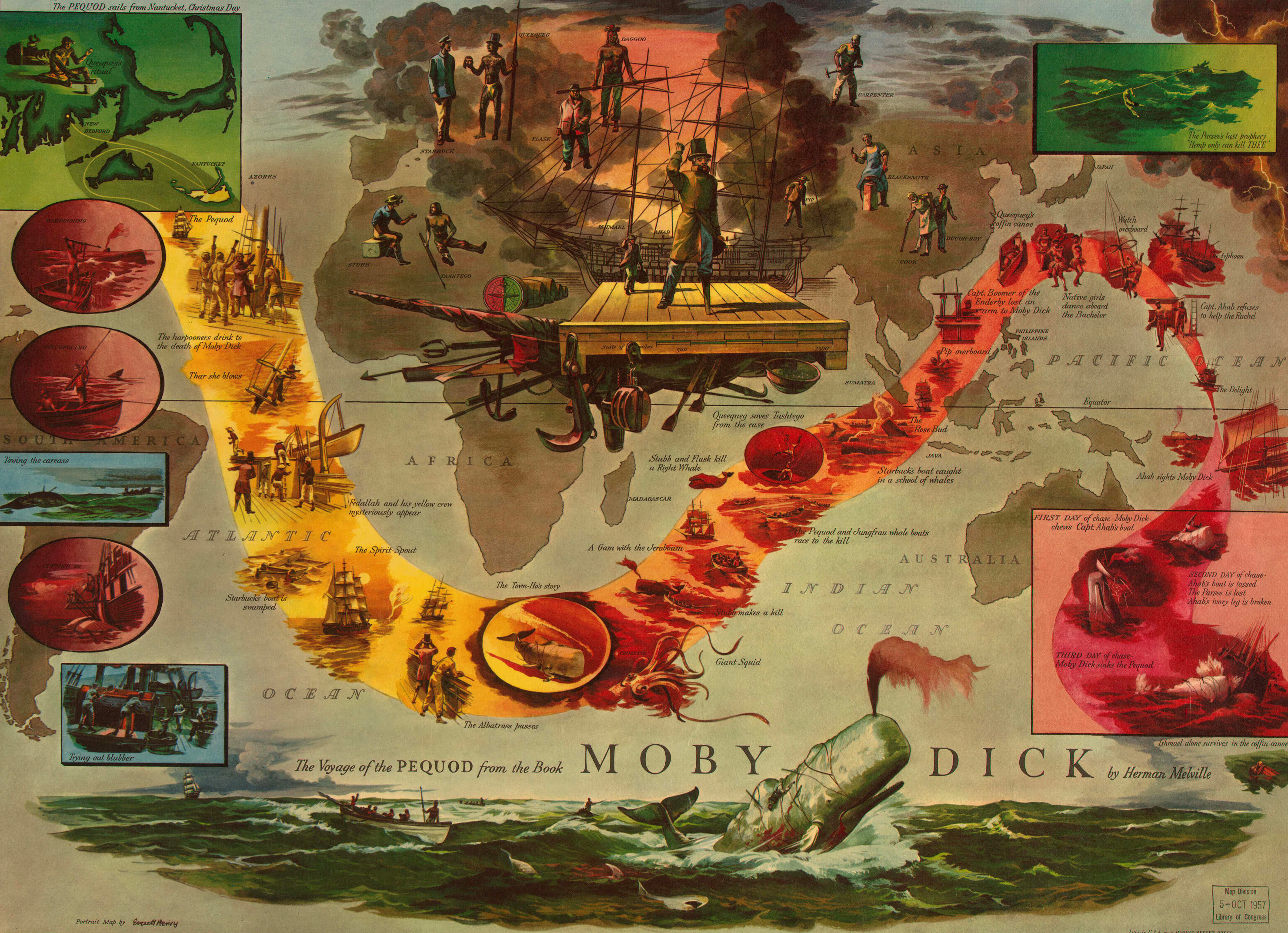Snapshot: A high-seas adventure recounting the tragedy of the whaling ship the Essex, the sinking of which inspired Herman Melville's Moby Dick.
From NOLA by Lindsey Bahr
Ron Howard's "In the Heart of the Sea" is a curious beast.
The ambitions are as big as a whale; the results are an earnest wreck.
It could possibly work if you think of the movie as a metaphor for the story it's trying to tell, but that's a little too meta for something that should be fairly straightforward.
It's ostensibly about the real expedition that inspired Herman Melville's "Moby-Dick" that Nathaniel Philbrick wrote about in his nonfiction book.
Voyage of the Pequod (illustrated by Everett Henry).
It's ostensibly about the real expedition that inspired Herman Melville's "Moby-Dick" that Nathaniel Philbrick wrote about in his nonfiction book.
But despite a promising start, something is lost in the spectacle and the framing device, which ultimately undermines its own story.
Howard uses Melville as a character (played by Ben Whishaw) and his curiosity about the mysterious circumstances of how the whaleship Essex sank as the audience's entry into the story.
Howard uses Melville as a character (played by Ben Whishaw) and his curiosity about the mysterious circumstances of how the whaleship Essex sank as the audience's entry into the story.
He's looking for big answers about the unknown.
So, he finds Tom Nickerson (Brendan Gleeson), the ship's only remaining survivor, who's drinking his life away.
At his wife's pleading, and Melville's promise of generous payment for one night's conversation, Tom starts to spill about the events of 30 years ago, when he was 14 (played by Tom Holland).
It's best not to do the math.
This is the story of two men, he says: A captain, George Pollard (Benjamin Walker), and his first mate, Owen Chase (Chris Hemsworth). Pollard is the son of the expedition's proprietor.
This is the story of two men, he says: A captain, George Pollard (Benjamin Walker), and his first mate, Owen Chase (Chris Hemsworth). Pollard is the son of the expedition's proprietor.
He's wealthy, arrogant, entitled and inexperienced.
What doesn't: The pieces never mesh together into a cohesive whole, with little insight to the characters and even less emotion.
Chase is the real seaman — a working-class Adonis with a classist chip on his broad shoulders.
He's also arrogant, but has the skills to back it up.
Chase flexes his hero muscles early, bounding up a ladder to cut free a tangled sail, and the captain responds with ill-advised bravado in leading the men full-speed into a squall.
But the "who leads" question is abandoned quickly and without much resolution once the whaling starts.
Perhaps the most striking scenes are those that deal with the process of catching a whale, from spearing to the gory disemboweling.
Perhaps the most striking scenes are those that deal with the process of catching a whale, from spearing to the gory disemboweling.
But whales are scarce on the ship's normal route and they must sail on to get enough oil for their bosses.
It's thousands of miles off the coast of South America where they encounter the big one, which locks on the Essex with a Terminator's resolve.
Hemsworth is best when he's by himself — either barking orders or doing something physical.
Of all the actors he shares scenes with, it's Cillian Murphy as his second mate who brings out something resembling emotion.
But we never really care about the lead, so there's little hope that we'll be interested in the rest of the men once it becomes solely about survival.
Indeed, most of the second half is spent drifting with them on lifeboats.
Indeed, most of the second half is spent drifting with them on lifeboats.
In these interminable minutes, we don't get anything resembling an understanding of how they survived (or didn't) either mentally or physically.
Future Tom Nickerson isn't much help either, and Melville is already too focused on his own literary ambitions to actually ask the big questions he told us he was seeking.
"In the Heart of the Sea" tries to be about so many things — ambition, capitalism, greed and survival. In the end, it feels most interested in how Herman Melville got his classic.
"In the Heart of the Sea" tries to be about so many things — ambition, capitalism, greed and survival. In the end, it feels most interested in how Herman Melville got his classic.
The pieces are there, but apparently it's up to "Moby-Dick" to assemble them, not Ron Howard.
Links :
Moby Dick (1956)
Links :
- NYDailyNews : Movie review: ‘In the Heart of the Sea’ is Ron Howard’s lackluster ‘Moby-Dick’
- SmithsonianMag : The True-Life Horror That Inspired Moby-Dick

No comments:
Post a Comment